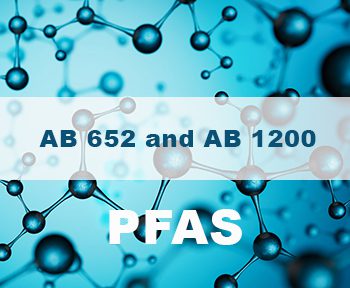New California Laws Ban PFAS in Juvenile Products and Food Packaging
November 3, 2021
Authors: Breana Inoshita, Downey Brand; Sophia Castillo, (now with Keller and Heckman); Steve Luis, Ramboll; Elizabeth Miesner, Ramboll
On October 5, 2021, Governor Gavin Newsom signed two bills prohibiting PFAS in juvenile products (AB 652) and disposable food packaging (AB 1200). The two new laws are a part of a trend in PFAS regulation in both California and national food law compliance.
The persistence, ubiquity, and uncertainty of the health effects of PFAS have prompted the push for PFAS regulation. PFAS, or perfluoroalkyl and polyfluoralkyl substances, are a group of man-made chemicals that are highly persistent in the environment. PFAS include thousands of chemicals that are diverse in structure, toxicity, and behavior. The most well-known PFAS are perfluorooctanoic acid (PFOA) and perfluorooctane sulfonic acid (PFOS). PFAS are widespread and can be found in many everyday products and can potentially be transferred to food or drinking water. The most prevalent uses include firefighting foam, paper coating, surface treatment, and certain electronics. Claims have been made linking some PFAS to possible adverse health effects, including increased cholesterol levels, reproductive problems, and cancer.
The two new laws join the complex and expanding PFAS regulatory landscape in California. In 2017, the California Office of Environmental Health Hazard Assessment (OEHHA) added PFOA and PFOS to the Proposition 65 List, which requires a warning about significant exposure to listed chemicals that are present in products sold to California consumers. Other PFAS are currently pending Proposition 65 listing. Recently, California has shown interest in regulating PFAS as a class. Effective July 2021, the Department of Toxic Substances Control (DTSC) adopted carpets and rugs containing PFAS as a “Priority Product” under the Safer Consumer Products Program. On September 24, 2021, DTSC initiated rulemaking to list treatments containing any PFAS for use on converted textiles or leathers as a “Priority Product.” In DTSC’s Safer Consumer Products work plan for 2021-2023, there is an emphasis on regulating PFAS in consumer products, especially children’s products and food packaging. AB 652 and AB 1200 build on DTSC’s regulation of consumer products and follow its approach of regulating PFAS as a class of chemicals.
AB 652
AB 652, introduced by Assemblymember Laura Friedman (D- Glendale), bans the sale or distribution of “juvenile products” containing PFAS. AB 652 is the first law in the United States to address PFAS in juvenile products. The law bans PFAS that a manufacturer intentionally adds to products for a functional or technical purpose and PFAS not added intentionally but present at concentrations at or above 100 parts per million in “juvenile products.” Juvenile products are products designed for use by infants and children under 12 years old. Examples of juvenile products include highchairs, playpens, strollers, and crib mattresses. AB 652 exempts children’s electronic products, medical devices, and internal components of juvenile products. The ban applies to all persons who manufacture, sell, or distribute new juvenile products. The new law requires manufacturers to replace PFAS with the least toxic alternative. The ban takes effect on July 1, 2023.
AB 1200
AB 1200, introduced by Assemblymember Phil Ting (D- San Francisco), includes two PFAS regulations in food packaging and cookware. First, AB 1200 bans the sale or distribution of food packaging containing PFAS that a manufacturer intentionally adds to products for a functional or technical purpose and PFAS not added intentionally but present at concentrations at or above 100 parts per million. Food packaging includes paper and plant-based take-out containers, utensils, and service ware. Like AB 652, AB 1200 also requires food packaging manufacturers to replace PFAS with the least toxic alternative. The ban takes effect on January 1, 2023.
AB 1200 also requires cookware manufactures to disclose whether intentionally added PFAS and other chemicals listed on the DTSC’s Candidate Chemicals List are in their products both on labels and online. The disclosure requirement takes effect on January 1, 2023, for online disclosures and January 1, 2024, for label disclosures.
AB 652 and AB 1200 represent another instance of California taking the lead over EPA in PFAS regulation. Simultaneously, DTSC is moving aggressively to take the lead nationwide in regulating PFAS in consumer products. At the federal level, the EPA recently released a PFAS Strategic Roadmap, which lays out a whole-of-agency approach to addressing PFAS over the next three years. The EPA’s current approach to PFAS regulation is less focused on consumer products and more concerned with continuing PFAS research, setting drinking water standards, and accelerating the cleanup of PFAS contamination.
These two new laws and forthcoming PFAS regulations will have widespread consequences across various industries. AB 652 and AB 1200 are notable because the bans apply to all persons involved in the product supply chains, and may leave companies across supply chains (importers, manufacturers, distributors, and retailers) at increased risk of liability. With new PFAS regulations coming from the state as well as the federal government, it is critical that the regulated community stay informed on the latest developments.
Steve Luis is a Principal with Ramboll with more than 20 years of experience helping clients with their most challenging environmental problems. His practice focuses on investigating the behavior of chemicals in the environment, assessing associated risks, and developing and implementing cost-effective cleanup strategies. He can be reached at [email protected], or via his LinkedIn page.
Elizabeth (Liz) Miesner is a Principal with Ramboll and has over 30 years of experience conducting and managing environmental health assessments. She has focused on chemical exposures and risk assessments of contaminated sites, vapor intrusion/indoor air quality, air toxic emissions, and consumer products. She can be reached at [email protected], or via her LinkedIn page.
Breana Inoshita is an Associate in the Natural Resources Group at Downey Brand. She is a recent graduate of UC Hastings College of the Law and pending admission to the California State Bar. Breana represents clients in a wide variety of environmental matters. She can be reached at [email protected].

